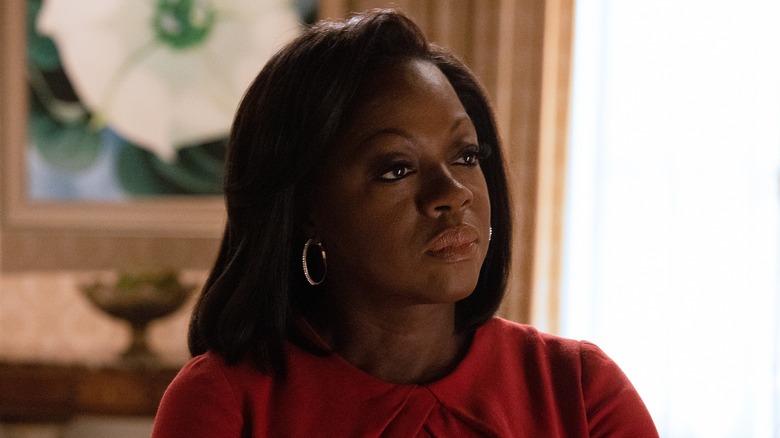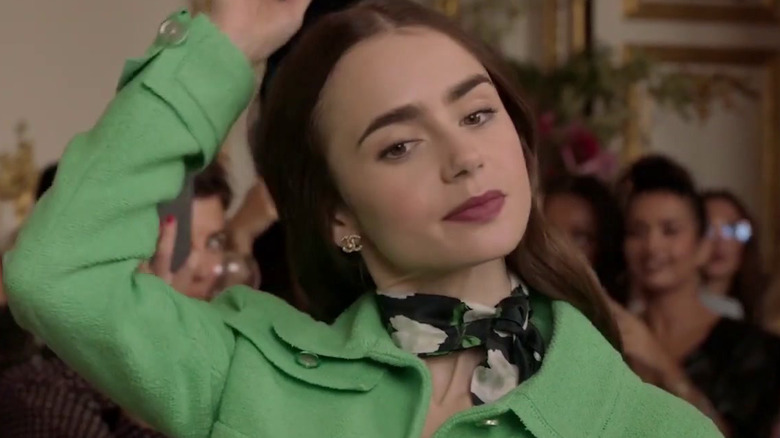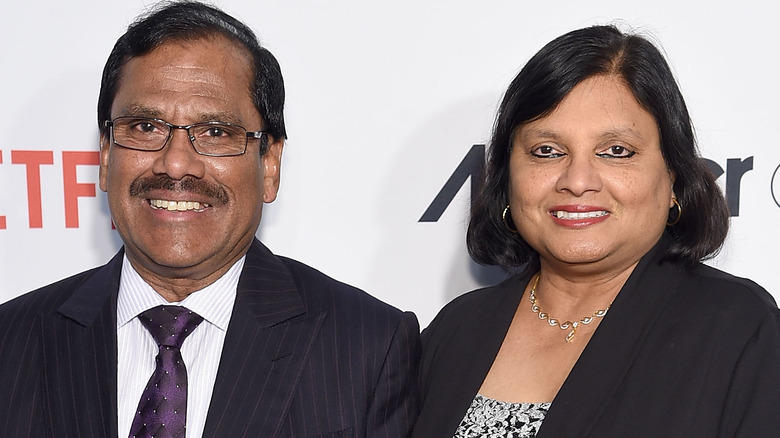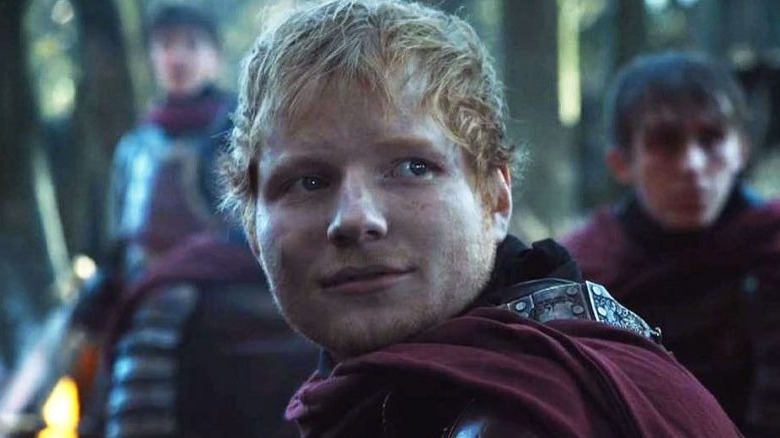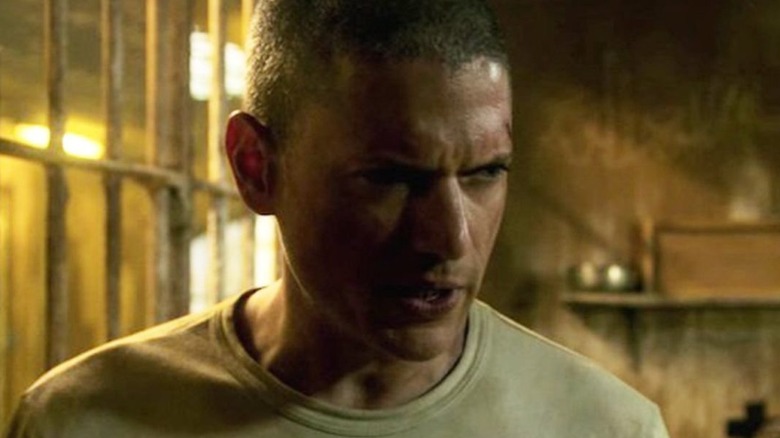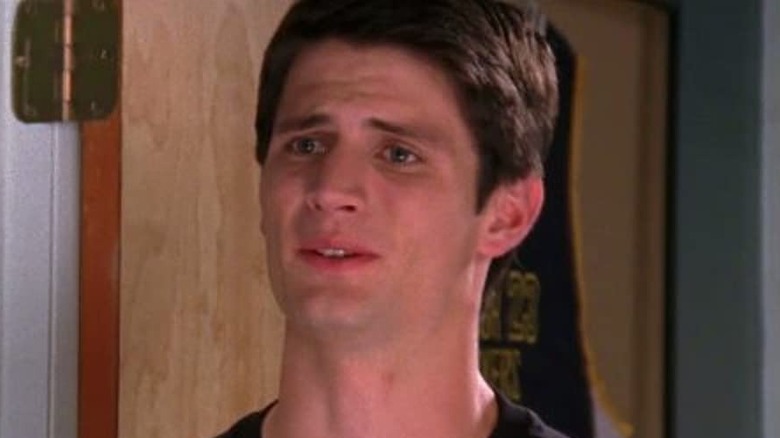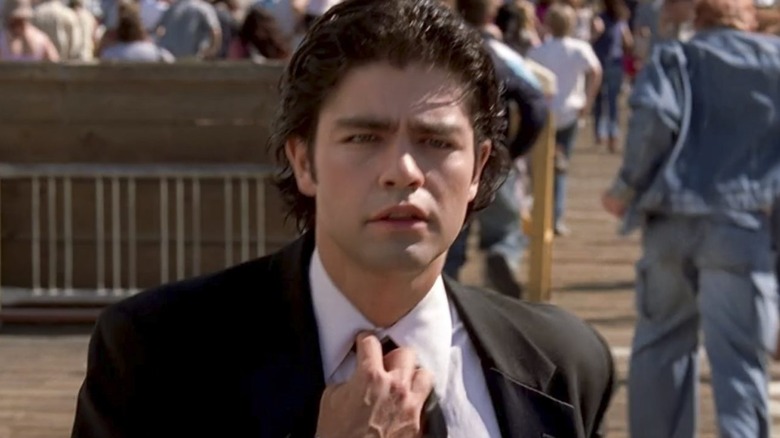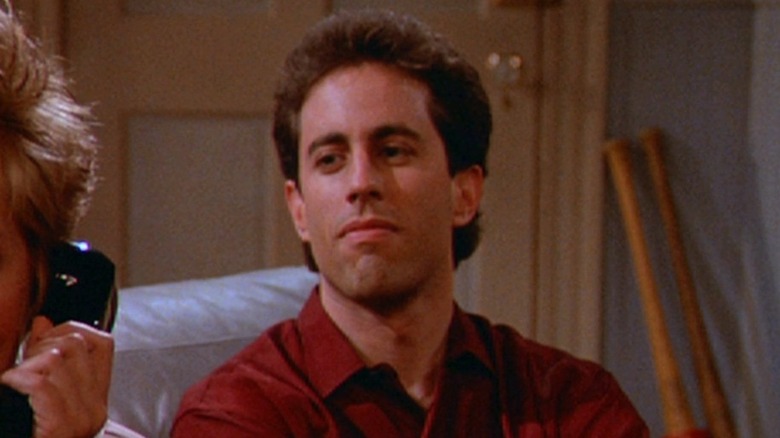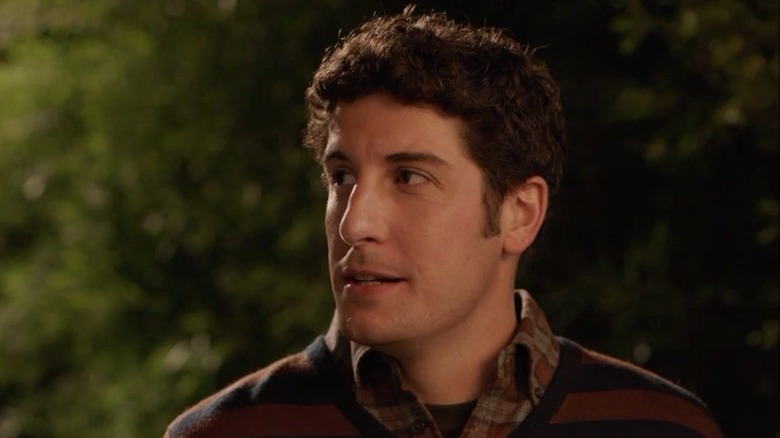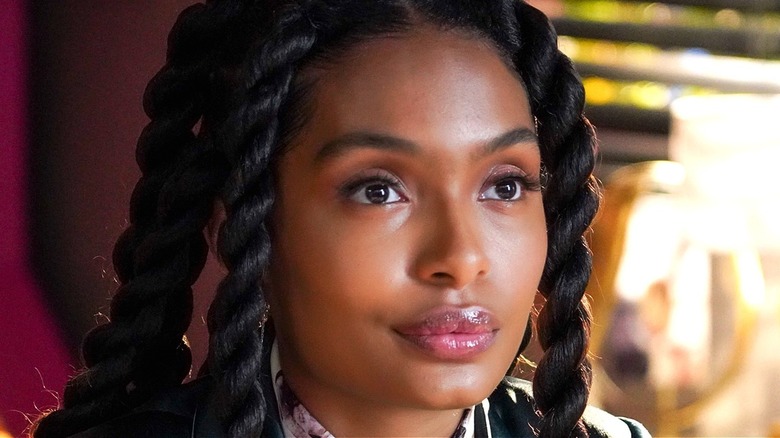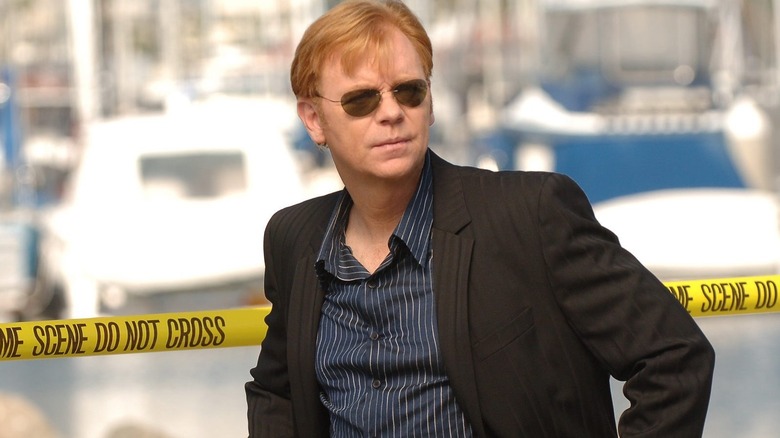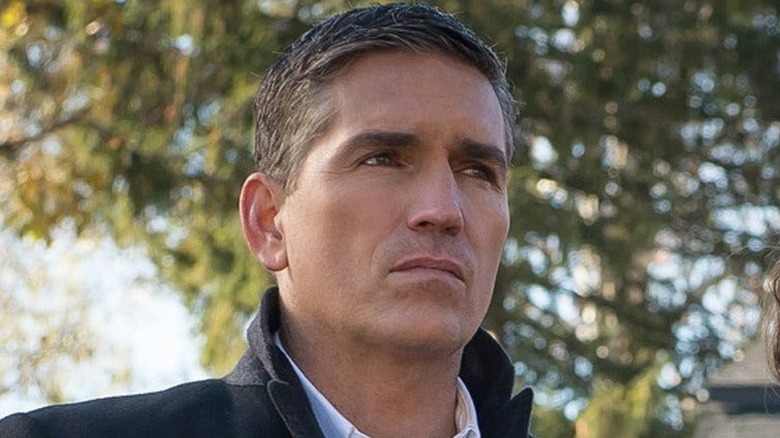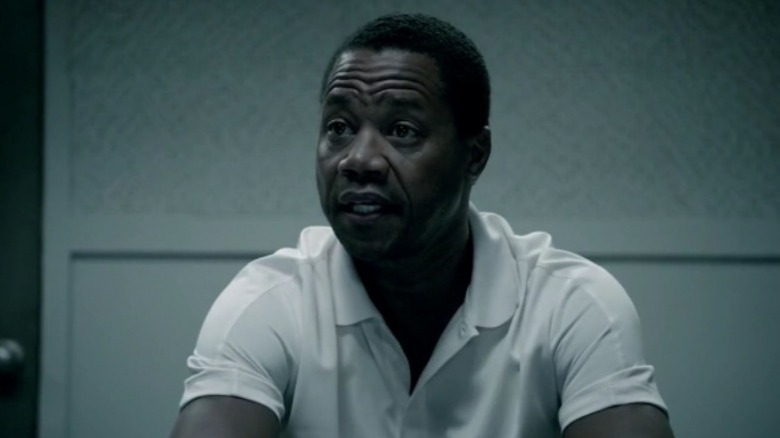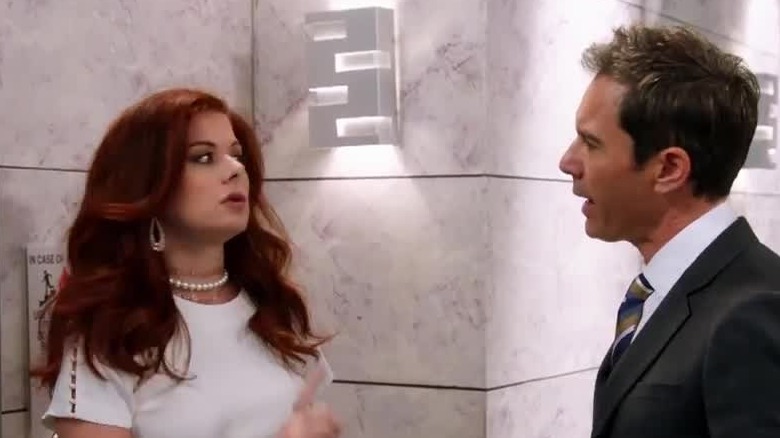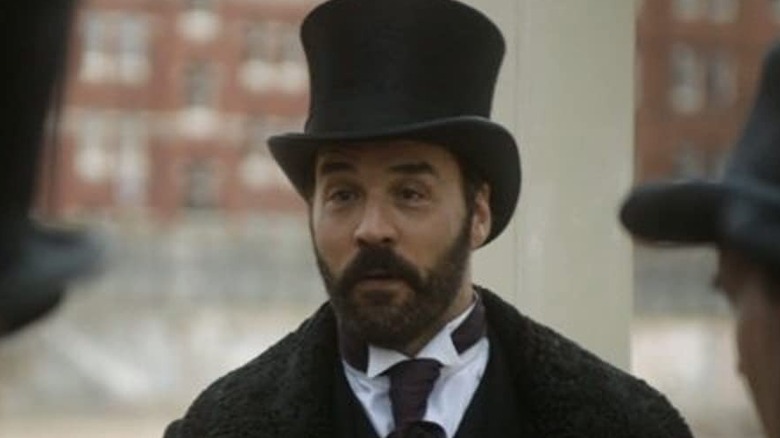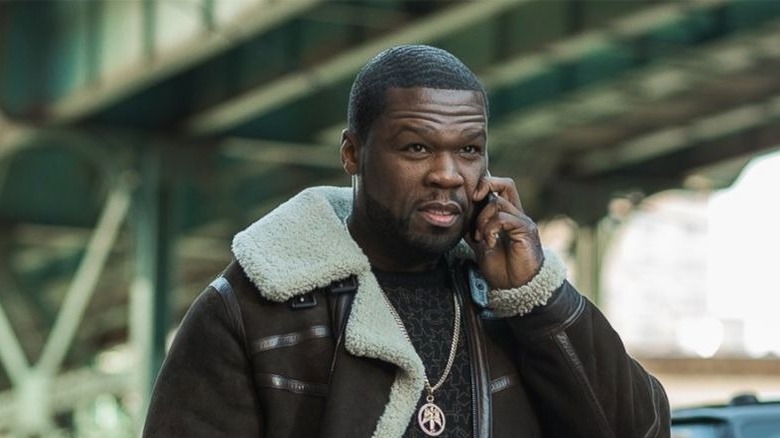Great TV Shows Almost Ruined By A Single Bad Performance
As the adage goes, "good casting is half the battle won." A lot of great TV shows owe their quality to pitch-perfect performances that were oftentimes appropriately recognized by awarding bodies. Roles like Bryan Cranston's career-defining turn as Walter White immediately come to mind. Conversely, when the casting is poorly done, TV shows often fail to recover from the bad acting.
However, plenty of great TV shows have had to pull through a single bad performance, as critically acclaimed shows are not always safe from having an actor's performance being singled out as lacking. Additionally, one bad performance — or even two — does not necessarily mean the actor is not talented. For example, Viola Davis' performance as Michelle Obama in "The First Lady" invited criticism and mockery, and she's one of her generation's greatest actors. Some would argue that just as much complexity goes into crafting a bad performance as a good one. Viola Davis said it best to the BBC when responding to the criticism she received, "Either you're doing too much or not enough."
Today we'll look at all the various instances of the previously mentioned middle ground of a single bad performance that almost – but not quite — derailed an entire show. These are great TV shows that almost got ruined by one single bad performance.
Lily Collins in Emily in Paris
In a sense, calling "Emily In Paris" great TV can be seen as fairly generous. However, the show earned a four-season run, a substantial fan base, and even a couple of, admittedly suspicious, awards nominations. Whether the show is considered great or just overrated is a topic for another day. What is clear is that Lily Collins bore the brunt of the criticism directed at the show in general.
In a review for HuffPost, Emma Gray opined that Lily Collins' performance had no charm, lacked enough quirk, and had no character. Various publications published reviews to the same effect, questioning the credibility of Collins' portrayal of an ex-pat in Paris. Most reviewers and fans found her character's knack for reinforcing old Parisian stereotypes and harboring questionable morals to be substandard.
What makes Lily Collins' performance so grating is that she approached the role of an unquestionably complicated protagonist with a lack of nuance usually reserved for parodies and "Saturday Night Live" sketches. Playing a protagonist that's not a likable person is a high-wire act that can go terribly wrong when approached the way Lily Collins chose to portray Emily.
Shoukath and Fatima Ansari in Master of None
Aziz Ansari's rise to the top of the industry was slow and measured, but he cemented his place when "Master of None" was released on Netflix. It quickly became a notable awards player, grabbing nominations for acting, writing, and production from multiple awards bodies, and the first season even got a 100% certified fresh rating on Rotten Tomatoes. Aziz Ansari was given free rein by Netflix, and he did almost everything right. However, one drawback of having little to no executive interference was his decision to cast his actual parents, Shoukath and Fatima Ansari, as the parents of his character, Dev.
The Independent UK noted that while it's obvious Ansari's real-life parents are not the best actors, their addition to the show was a touching tribute because the underlying theme of the entire show is how second-generation immigrants lack gratitude for their parents. That notwithstanding, there is an argument to be made that their poor acting hurt the show by being a distracting addition and ultimately undercutting any touching scenes they were in. To further this point, one of the most critically acclaimed episodes from Season 2, "Thanksgiving," was heavily inspired by Lena Waithe's real life, and for her mother's role, they instead hired veteran actor Angela Bassett, who knocked it out of the park.
Hiring amateur actors serves TV shows and movies all the time, but it only works if the intention is to carve out authenticity.
Ed Sheeran in Game of Thrones
In the 2010s, "Game of Thrones" was perhaps the biggest show on TV, and the series made stars out of previously unknown actors. The main cast was universally considered perfect, and the strength of that casting helped make "Game of Thrones the rare fantasy genre offering to gain a large audience. However, with such a high bar set, even cameos must maintain that standard. Unfortunately, when the showrunners decided to surprise Maisie Williams with an Ed Sheeran cameo as a Lannister soldier where he sang around a campfire, this standard was greatly missed, according to the Evening Standard.
Cameos can easily come off as corny if the showrunners don't take time to measure the established tone of their show and whether the cameo would greatly serve said tone. Shows like "Entourage" and "Atlanta" mastered juggling cameos and figuring out how they'd fit into the world of their shows. Ed Sheeran didn't work because he absorbed all the attention from Arya Stark when he showed up onscreen. It looked like one of his music videos, and it rightfully drew ridicule all over social media. Matt Barrie, a TV personality, even joked on Twitter that "Game of Thrones" fans should next expect a cameo by the rap group Migos.
Fortunately, the show was much bigger than that, and the final season had other issues that greatly overshadowed this minor Season 7 misstep.
Wentworth Miller in Prison Break
Oftentimes, a show is only as good as the concept and the lead performance. "Prison Break" certainly goes one of these two ways, with the interesting premise of a person getting caught committing a crime purposely so he can break out his brother, who is on death row for a crime he did not commit. Wentworth Miller plays the lead as Michael Scofield, who masterminds the entire plan, which is constantly complicated by the hardened criminals inside the prison and a growing government conspiracy.
Fans preferred the livelier and more layered performances of the supporting cast, especially Sucre (Amaury Nolasco) and fan-favorite T-Bag (Robert Knepper). However, Tom Shales from The Washington Post wrote, "Miller's performance as Scofield may not be the worst in the series, but since Miller is hardly ever off-screen, it's easily the most oppressive."
Miller's performance was always monotoned, and no matter what the scene asked of him — joy or grief — all Miller ever mustered up was an incredulous look. Frustration with his performance quickly led to boredom, and what started as one of the greatest shows of its era eventually buckled under pressure in the later seasons. But when it was still good, it was despite Miller, not because of him.
James Lafferty in One Tree Hill
"One Tree Hill" premiered in an era where teen dramas like "The OC" and "Gossip Girl" sandwiched its earlier and later seasons. As such, it would've been easily erased by the sands of time was it not for the particular aspects that made it so unique. The TV show was centered around two half-brothers from different sides of the tracks who happen to be great at basketball and end up playing for the same high school basketball team. Chad Michael Murray impressively played the lead as Luke Scott while James Lafferty played his brother Nathan Scott.
Insider notes that Lafferty was the youngest cast member when the show was cast and, consequently, the least experienced. It shows, especially in the earlier seasons. Nathan Scott is the son that takes mostly after his father, probably because he grew up with him, unlike Luke. Lafferty's stoic approach to the character just never quite worked, and when the time for the inevitable redemption arc began, some audience members had already stopped caring about his story at all.
Adrian Grenier in Entourage
"Entourage" was a show about four young guys trying to make it in Hollywood. The simplicity of the premise is what made the show so enthralling. The show offered a window for viewers to explore the often bonkers showbiz industry in a way that frankly has not been able to be replicated since.
The show was centered around Adrian Grenier's character Vincent Chase rising to the top as an actor and how that affected not only his friends but the industry as a whole, all among a backdrop of celebrity cameos throughout the show's 8-season run. Even so, one question that remained in the critics' and even the fans' minds was, "Is Vince even a good actor in the show?" It certainly was examined overtly, and signs pointed towards no. Was it that Vince was supposed to be played as a bad actor, or was it just the best Grenier could do?
Touré profiled Adrian Grenier for The Daily Beast after the release of the show's fifth season. His verdict was that Adrian Grenier was always outshone by Jeremy Piven and Kevin Dillon, and despite his physicality being a bright spot, whenever he spoke there was never anything riveting to be observed. It's pretty hard to disagree with that.
Jerry Seinfeld in Seinfeld
"Seinfeld" is undoubtedly one of the greatest comedies of all time. To this day, there are still iconic pop cultural moments that can be traced back to it. The strength of the show was mostly down to the phenomenal writing that was led by the ever-impressive Larry David and Jerry Seinfeld. It didn't hurt either that the cast included an outstanding Jason Alexander, Michael Richards, and the evergreen Julia Louis-Dreyfus. The one actor who didn't quite have the chops, ironically, was Seinfeld himself.
Seinfeld himself later admitted to Outsider that he sometimes struggled to avoid breaking character and complete his scenes. He often could barely keep a straight face and never truly settled in as a natural in his role. After the show's run, Seinfeld slowed down his acting significantly, explaining during a Reddit AMA that he prefers shorter comedic shows or just stand-up comedy.
However, in a certain sense, Seinfeld's poor acting skills often ended up making the show better because the audience always wants to join in when Jerry can barely hold his laughter.
Jason Biggs in Orange Is the New Black
"Orange Is the New Black" was maybe Netflix's first viral hit. This fictionalized show is based on a true crime and follows Piper Chapman's (Taylor Schilling) misadventures at a minimum-security federal prison. Larry Bloom (Jason Biggs), on the other hand, is her fiancé on the outside who became an instantly hated character.
As previously established, being hated on TV is tricky because, ideally, the show's creators want to develop a character who the audience loves to hate, not just hate, period. Unfortunately, in this case, it was the latter. Part of the issue could have been the moments when Netflix added actions that the real-life Bloom was never a part of, making the character seem worse than he actually was. For instance, Bloom stated in an interview with Jason Biggs that the infamous fart scene, which didn't go over as well with audiences, never happened, per Entertainment Weekly.
Biggs, for his part, mentioned how he's not a method actor and that his process is simply learning his lines and the following directions. As such, this could be a case of the poor performance being more the fault of the writers and directors rather than the actor himself. It was quickly fixed when he was written out of the show from Season 3 onwards.
Yara Shahidi in Grown-ish
Kenya Barris created a hit for ABC when he came up with "Black-ish," with a charming cast that included lovable child actors with unimaginably precise comedic timing. As the child actors grew and "Black-ish" continued to be renewed for new seasons, then the only logical next step was to give Yara Shahidi a spin-off titled "Grown-ish," which was set in college.
It had a simple setup where the main characters were stuck in a night class for one reason or another. As the show goes on, they end up dating and hating each other. It was heavily inspired by "The Breakfast Club," and the similarities were impossible to miss. However, the writing was noticeably sloppier, and the actors did little to elevate the text. Glenn Garvin wrote a disparaging review of the first season for Reason, adding that he considers the whole cast talentless. This transition was especially tough for Shahidi, who this time was required to perform more than just perfectly timed quips and comebacks. Her performance in major emotional moments almost always fell flat.
Shahidi's saving grace, however, was that the show had a ragtag list of characters who more or less were already public figures playing a heightened version of themselves, something that Shahidi could do well. She's incredibly charming, and that carries the show with ease.
David Caruso in CSI: Miami
David Caruso's turn as Horatio Caine is as synonymous with bad acting as coffee is with mornings. His pompous, ridiculous, and overwrought performances in "CSI: Miami" were the source of ridicule and bemusement from everyone faithfully tuning in to the show every week.
Whether David Caruso is a good actor is a universal question for everyone familiar with his work. He started getting attention in the early '90s for his impressive performances in "NYPD Blue." He then tried transitioning into movies like his peers, but it didn't quite work out. When the new millennium came, he was back on TV in "CSI: Miami," but he had noticeably decided to up the ante on everything about his persona. He came with catchphrases and signature moves. It was all completely absurd. Esquire even published an article titled, "Why Does David Caruso Continue Getting Work as an Actor?"
However, as time went by, everyone realized that there was a method to his madness. As critics started making jokes about his performance, the notoriety of his show continued to grow and grow to make it the most popular TV show in more than 20 countries during its prime.
Jim Caviezel in Person of Interest
"Person of Interest" starts as a procedural science fiction crime drama where each episode solves a new case. It's a good hook, line, and sinker because, on the one hand, it appeals to more casual TV watchers who don't want to have to watch every episode. On the other hand, people who are more accustomed to serialized TV also get rewarded later on in the show as a more overarching storyline starts building slowly at the latter end of the first season.
Now, this is where the trouble starts. Jim Caviezel plays the lead as John Reese, and his performance is very effective when the show is just a procedural, but as the show grows, his performance is unable to evolve with it. To put it plainly, there's no growth in his character. Aaron Riccio of Slant Magazine wrote that while there were issues with other cast members in the series,"they can't exactly bring less to the table than Caviezel."
Luckily, with a writing team led by Jonathan Nolan and a producing team that includes J.J. Abrams, it was easy to fill in the cracks left by Caviezel's performance.
Cuba Gooding Jr. in American Crime Story
"American Crime Story" Season 1 came swinging for the fences by tackling OJ Simpson's murder trial, popularly known as the trial of the century. What made the show so thrilling was how it not only focused on the specifics of the case but also on everything that surrounded the situation while highlighting the unharmonious race relations of mid-'90s Los Angeles.
The show was incredibly accurate as the creators knew that when depicting such a sensitive case involving a gruesome crime that affected real people, they couldn't take too many creative liberties. As such, most of the cast brought in their A-game, including Courtney B. Vance, John Travolta, Sterling K. Brown, and Sarah Paulson. The same can't be said of Cuba Gooding Jr., however. He simply just wasn't memorable. The Guardian, among others, wrote that Cuba Gooding Jr. also looked or sounded nothing like O.J. Simpson.
Biopics can be complicated because mimicry isn't always a sure-fire way to create a compelling performance, but the performance must at the very least remind you of the person being portrayed.
Eric McCormack and Debra Messing in Will & Grace
When "Will & Grace" first premiered, it not only had a tough time competing with "Ally McBeal," but it also got criticized by both sides of the aisle. Some people did not want a sitcom centering around gay characters at all, and some people felt like "Will & Grace" was not subversive enough as it seems on paper. But one thing is for sure: Eric McCormack and Debra Messing were not funny at all, especially for leads in a sitcom.
Most of the show centered around their friendship, and they both seemingly played the straight man against each other's performance, and as a result, the jokes didn't land. Michael Idato from Stuff observed that McCormack and Messing are just too centered to actually be funny as Jack (Sean Hayes) and Karen (Megan Mullally), who constantly steal the show. Luckily, these two were very much in-form and for a good five seasons, almost everything they uttered left the audience in stitches. They were also handsomely rewarded, with both Hayes and Mullally winning individual awards from the much more actor-focused SAG awards during the show's initial run.
Ultimately, the show is saved by the many laugh-out-loud and iconic catchphrases created by Hayes and Mullally, even if the two leads could never truly keep up.
Jeremy Piven in Mr. Selfridge
Jeremy Piven is best known for his very impressive role as Ari Gold, an egomaniac super-agent in "Entourage." As such, it's easy to see why he carried that performance over to a role where he played the business magnate Henry Gordon Selfridge, who revolutionized retail stores in the early 20th century. In Season 1, Piven's performance as the lead in "Mr. Selfridge" is so similar to his previous role that it almost feels like he is unaware of the kind of show he's in — or perhaps he still thinks he's on the set of "Entourage."
Jeremy Piven was miscast as the central role, as summarized by Tim Goodman of The Hollywood Reporter. However, as the show went on, the writing got better and better, and the side characters rose to the occasion by making their small roles count. By the third and fourth seasons, the show had almost completely turned into an ensemble piece.
So just like Piven saved "Entourage" as a supporting character who always stole the show, he too was saved in a similar manner in "Mr. Selfridge."
Curtis Jackson in Power
"Power" didn't start on a strong footing. The series followed the trials and tribulations of a New York City drug dealer, Ghost (Omari Hardwick), who runs a nightclub. The reason why Season 1 didn't quite work was that it was derivative and sometimes just uninteresting. However, despite the critical bashing the show took in Season 1, it still managed to have a respectable run and spawn a few spin-offs.
The pull could probably be attributed to the fact that it was produced by Curtis "50 Cent" Jackson, who had amassed a loyal fanbase through other forms of media. His positive contributions ended there, though, as The Hollywood Reporter's Tim Goodman compared Jackson's performance to his infamous baseball pitching skills.
The seasons get better and better as the actors get more comfortable in their roles. The dialogue improved, as did the tension and drama, and the show eventually redeemed itself in the eyes of critics, as measured by Rotten Tomatoes. Jackson, however, could only work with the few arrows he had in his quiver until his character's bitter end.
